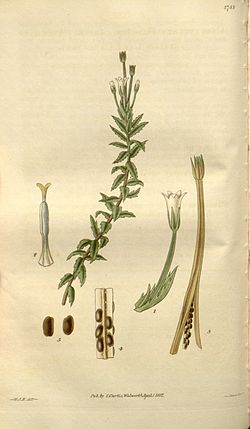| Prismatocarpus | |
|---|---|
 | |
| Curtis's botanical magazine (Plate 2733) | |
| Scientific classification | |
| Kingdom: | Plantae |
| Clade: | Tracheophytes |
| Clade: | Angiosperms |
| Clade: | Eudicots |
| Clade: | Asterids |
| Order: | Asterales |
| Family: | Campanulaceae |
| Subfamily: | Campanuloideae |
| Genus: | Prismatocarpus L'Hér. |
| Species [1] | |
27; see text | |
| Synonyms [1] | |
| |
Prismatocarpus is a genus of flowering plants belonging to the family Campanulaceae. First described in 1789, [2] this genus includes 27 species endemic to the Cape Provinces of South Africa. [1]